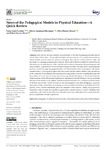Mostrar o rexistro simple do ítem
News of the Pedagogical Models in Physical Education: A Quick Review
| dc.contributor.author | Arufe-Giráldez, Víctor | |
| dc.contributor.author | Sanmiguel-Rodríguez, Alberto | |
| dc.contributor.author | Ramos, Oliver | |
| dc.contributor.author | Navarro Patón, Rubén | |
| dc.date.accessioned | 2023-03-27T10:43:11Z | |
| dc.date.available | 2023-03-27T10:43:11Z | |
| dc.date.issued | 2023-01-31 | |
| dc.identifier.citation | Arufe-Giráldez, V.; Sanmiguel-Rodríguez, A.; Ramos-Álvarez, O.; Navarro-Patón, R. News of the Pedagogical Models in Physical Education—A Quick Review. Int. J. Environ. Res. Public Health 2023, 20, 2586. https://doi.org/10.3390/ijerph20032586 | es_ES |
| dc.identifier.issn | 1661-7827 | |
| dc.identifier.uri | http://hdl.handle.net/2183/32774 | |
| dc.description.abstract | [Abstract] In the last two decades, research has proliferated in the field of pedagogical models used in school Physical Education. The growth is so high that it is necessary to do a quick review to know which models currently exist and which are emerging. The objective of this work is to collect all the models or pedagogical approaches present in the scientific literature related to school Physical Education and to make known, to the scientific and academic community, its main purposes and characteristics. A quick review of the literature found in the Web of Science and Scopus databases has been carried out using “pedagogical model” and “Physical Education” as descriptors. The results revealed a total of 19 pedagogical approaches that record scientific evidence linked to their application in the classroom. It was detected that some models or approaches were more scientifically supported than others, as is the case for Cooperative Learning, Sports Education, or Teaching Games for Understanding, while others barely registered in international scientific literature. It was concluded that researchers need to work together with Physical Education teachers to analyze the effectiveness of all these approaches. School teachers are also encouraged to vary their pedagogical approach depending on the content they are working on and the positive effects they are looking for in the psychic, motor, affective-emotional, and social domains of the students. Finally, it is proposed to researchers who promote new models or approaches a greater clarity of these to facilitate their application in the field of school Physical Education, since some difficulty has been detected in the practical application of some approaches. | es_ES |
| dc.language.iso | eng | es_ES |
| dc.publisher | MDPI | es_ES |
| dc.relation.uri | https://doi.org/10.3390/ijerph20032586 | es_ES |
| dc.rights | Atribución 3.0 España | es_ES |
| dc.rights.uri | http://creativecommons.org/licenses/by/3.0/es/ | * |
| dc.subject | Pedagogical models | es_ES |
| dc.subject | Physical education | es_ES |
| dc.subject | Educational innovation | es_ES |
| dc.subject | Active methodologies | es_ES |
| dc.title | News of the Pedagogical Models in Physical Education: A Quick Review | es_ES |
| dc.type | info:eu-repo/semantics/article | es_ES |
| dc.rights.access | info:eu-repo/semantics/openAccess | es_ES |
| UDC.journalTitle | International Journal of Environmental Research and Public Health | es_ES |
| UDC.volume | 20 | es_ES |
| UDC.issue | 3 | es_ES |
| UDC.startPage | 2586 | es_ES |
Ficheiros no ítem
Este ítem aparece na(s) seguinte(s) colección(s)
-
UI- UNIDEF - Artigos [35]






